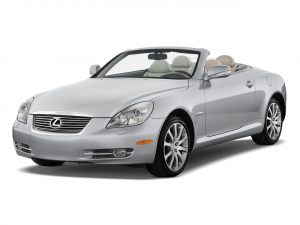Complete digital official shop manual contains service, maintenance, and troubleshooting information for the 1991-2010 Lexus SC300, SC400, SC430. Diagnostic and repair procedures are covered in great detail to repair, maintain, rebuild, refurbish or restore your vehicle like a professional mechanic in local service/repair workshop. This cost-effective quality manual is 100% complete and intact as should be without any missing pages. It is the same factory shop manual used by dealers that guaranteed to be fully functional to save your precious time.
This manual for 1991-2010 Lexus SC300, SC400, SC430 is divided into different sections. Each section covers a specific component or system and, in addition to the standard service procedures, includes disassembling, inspecting, and assembling instructions. A table of contents is placed at the beginning of each section. Pages are easily found by category, and each page is expandable for great detail. It is in the cross-platform PDF document format so that it works like a charm on all kinds of devices. You do not need to be skilled with a computer to use the manual.
EXCERPT:
The 1 UZ–FE engine has 8–cylinders in a V–arrangement at a bank angle of 90°. From the front of the RH bank cylinders are numbered 2 – 4 – 6 – 8, and from the front of the LH bank cylinders are 1 – 3 – 5 – 7. The crankshaft is supported by 5 bearings inside the crankcase. These bearings are made of a copper and lead alloy. The crankshaft is integrated with 8 weights for balance. Oil holes are placed in the center of the crankshaft to supply oil to the connecting rods, bearing, pistons and other components. The ignition order is 1 – 8 – 4 – 3 – 6 – 5 – 7 – 2. The cylinder head is made of aluminum alloy, with a cross flow type intake and exhaust layout and with pent–roof type combustion chambers. The spark plugs are located in the center of the combustion chambers. At the front and rear of the intake manifold, a water passage has been provided which connects the RH and LH cylinder heads. Exhaust and intake valves are equipped with irregular pitch springs made of special valve spring carbon steel which are capable of functioning at all engine speeds. The RH and LH intake camshaft are driven by a timing belt, and a gear on the intake camshaft engages with a gear on the exhaust camshaft to drive it. The cam journal is supported at 5 (intake) or 4 (exhaust) places between the valve lifters of each cylinder and on the front end of the cylinder head. Lubrication of the cam journals and gears is accomplished by oil being supplied through the oiler port in the center of the camshaft. Adjustment of the valve clearance is done by means of an outer shim type system, in which valve adjusting shims are located above the valve lifters. This permits replacement of the shims without removal of the camshafts. Pistons are made of high temperature–resistant aluminum alloy, and a depression is built into the piston head to prevent interference with the valves. Piston pins are the full–floating type, with the pins fastened to neither the piston boss nor the connecting rods. Instead, snap rings are fitted on both ends of the pins, preventing the pins from falling out.
The No.1 compression ring is made of steel and the No.2 compression ring is made of cast iron. The oil ring is made of a combination of steel and stainless steel. The outer diameter of each piston ring is slightly larger than the diameter of the piston and the flexibility of the rings allows them to hug the cylinder walls when they are mounted on the piston. Compression rings No.1 and No.2 work to prevent gas leakage from the cylinder and the oil ring works to scrape oil off the cylinder walls to prevent it from entering the combustion chambers. The cylinder block is made of aluminum alloy with a bank of 90°. Cast iron cylinders are installed inside the cylinder block. It has 8 cylinders which are approximately twice the length of the piston stroke.
…
